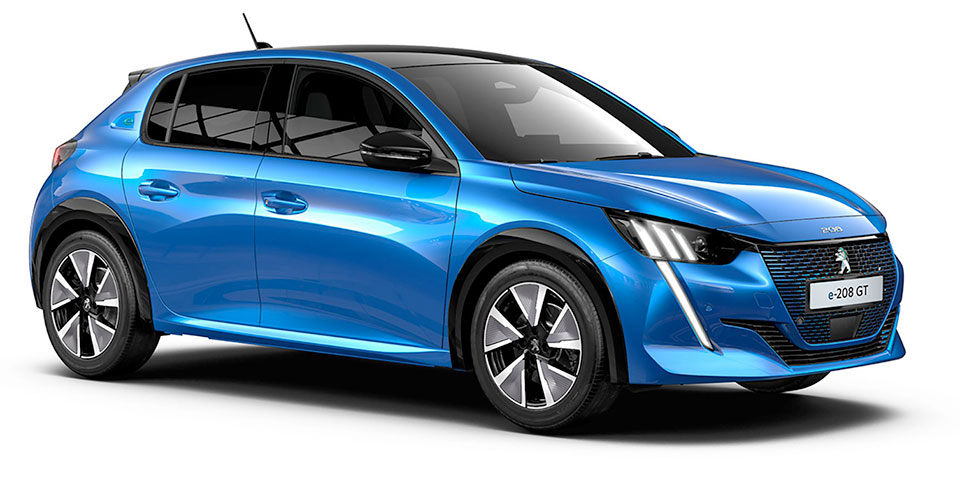Top 10 Affordable Electric Cars For 2020

Many of us in the past decade may not have paid enough attention to electric cars. However, the evolution of the automotive sector brought great improvements and more affordable prices. For 2020 we singled out 10 models for anyone interested in moving… electric without paying a lot of money! Electric cars are called «EV» which are the initials of the phrase «Electric Vehicle».
- Opel Corsa: Opel first introduced the all-electric version of the new «generation» Corsa and then the conventional versions of its new supermini model, showing the great importance of the Corsa e for the company. The new electric model is based on the «e-CMP» platform of the PSA Group, has an electric motor with a maximum output of 136 PS and a maximum torque of 260 Nm. For the process 0-100 km / h it takes 8.1 sec, while its final speed reaches 150 km / h. According to the «WLTP» protocol, its maximum theoretical autonomy reaches 330 km.
- Peugeot e-208: Peugeot is one of the leading European carmakers in the creation of electric vehicles and the know-how it has acquired on them is reflected in the most representative way in the new e-208. The purely electric version of the new «generation» supermini model of the French company has lithium-ion batteries with a capacity of 50 kWh which give a maximum theoretical range of 340 km. Its electric motor has a maximum power of 136 PS and a maximum torque of 260 Nm. In terms of performance, the Peugeot e-208 accelerates from 0-100 km / h in 8.1 sec and its top speed reaches 150 km / h.
- Skoda CITIGOe iV: Skoda has included in its range the purely electric version of Citigo which is based on the technology of the Volkswagen Group. The CITIGOe iV is the first electric car in the history of the Czech car industry and is manufactured at its plant in Bratislava (Slovakia). The CITIGOe iV, as it is called, has 32.2 kW lithium-ion batteries and an electric motor with a maximum power of 83 PS and a maximum torque of 212 Nm. The Skoda electric city vehicle has a range of 260 km, based on the «WLTP» protocol. According to the company, it accelerates from 0-100 km / h in 12.3 sec while its final speed is electronically limited to 130 km / h. CITIGOe iV has an energy management system with three different programs. In «Normal», its performance is without any restrictions. In «Eco», the central electronic unit limits the maximum power to 68 PS and the final speed to 120 km / h for reduced power consumption. Finally, in the «Eco» program the maximum power is further reduced to 54 PS, the maximum torque to 133 Nm and the final speed to 95 km / h.
- Volkswagen ID.3: ID.3 is the first Volkswagen model to be designed from the ground up as a true electric car. That is, it was based on the «MEB» platform, which was designed and created exclusively for such a vehicle, has been shaped with the needs of a car of this category and offers advantages to the greatest extent possible. Available in three versions regarding its batteries. In the first, has an energy capacity of 45 kWh and offers a range of 330 km («WLTP» protocol). In the second, the capacity reaches 58 kWh and the range increases to 420 km. Finally, in the third version, the batteries are 77 kWh and the autonomy peaks at 550 km. Its electric motor has a maximum output of 204 PS and the final speed of the Volkswagen ID.3 is limited to 160 km / h.
- Volkswagen e-up!: The e-up! has the upgraded 32.3 kWh batteries, compared to those that existed before in the corresponding version of the model. The «little brother» of the Skoda CITIGOe iV has a range of up to 260 km, accelerates from 0-100 km / h in 11.9 sec and its top speed reaches 130 km / h. Its electric motor has a maximum power of 83 PS and its maximum torque reaches 212 Nm.
- Nissan Leaf: Nissan took the opportunity to bring into production the second generation of the successful model. With targeted improvements, the electric motor delivers 40 kWh (10 more than the first generation), while the autonomy – which was one of the disadvantages of the previous Leaf – reaches 380 km. The charging system is also improved as it now promises faster operation. The EV is considered one of the most economical cars in its daily life and maintenance.
- Hyundai Ioniq: Hyundai is the company that has probably taken leaps and bounds in the evolution of its cars and for this reason an affordable electric car could not be missing from its range. The 118 hp Ioniq is front-wheel drive, with a lithium-ion battery pack, delivering 28 kWh. Its range can reach 280 km on a single charge, while it reaches 100 km / h from a standstill in just over 10 ”.
- Renault Zoe: The small EV’s category is gaining more and more interest as the car manufacturers decided to give them special emphasis and a substantial share of the budget. It has better quality materials inside, greater autonomy (reaches 400km) and greater power (52 kWh compared to 41 kWh of the previous generation). The Zoe has a quick charge function so that with half an hour in the socket it can travel 150 km.
- BMW i3: It went through a facelift in 2018 so the renewed i3 is lower, wider and with 20 ” wheels. It produces 170 hp with an electric motor with a capacity of 33 kWh, 0-100 km / h is a matter of 7.3 “, while its autonomy with prudent driving can reach 300 km.
- Tesla Model X: The American SUV may not be the most economical electric car on the market, but it is certainly one of the most impressive. With falcon doors reminiscent of a concept car, the new Model X reaches 100km / h in less than 3 ” and its range reaches 500km. The SUV is available in two (electric of course) versions (Long Range and Performance), with orientation to autonomy and performance respectively. The first delivers 553 hp and the second 785 hp.
Have you read?
World’s Best Countries For A Child To Be Born In.
World’s Best Countries For Its Citizens To Live.
World’s Best Countries For Cultural Influence.
World’s Best Countries For Entrepreneurship.
Bring the best of the CEOWORLD magazine's global journalism to audiences in the United States and around the world. - Add CEOWORLD magazine to your Google News feed.
Follow CEOWORLD magazine headlines on: Google News, LinkedIn, Twitter, and Facebook.
Copyright 2025 The CEOWORLD magazine. All rights reserved. This material (and any extract from it) must not be copied, redistributed or placed on any website, without CEOWORLD magazine' prior written consent. For media queries, please contact: info@ceoworld.biz








